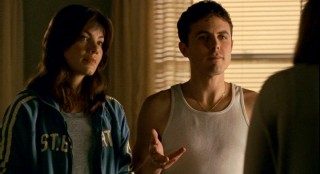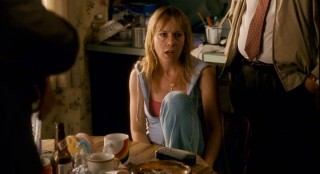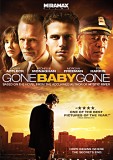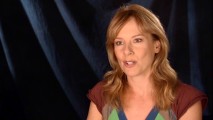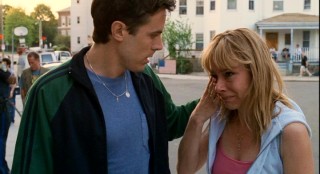Gone Baby Gone DVD Review
 |
Gone Baby Gone
Theatrical Release: October 19, 2007 / Running Time: 114 Minutes / Rating: R Director: Ben Affleck / Writers: Ben Affleck, Aaron Stockard (screenplay); Dennis Lehane (novel) Cast: Casey Affleck (Patrick Kenzie), Michelle Monaghan (Angie Gennaro), Morgan Freeman (Jack Doyle), Ed Harris (Remy Bressant), John Ashton (Nick Poole), Amy Ryan (Helene McCready), Amy Madigan (Bea McCready), Titus Welliver (Lionel McCready), Michael Kenneth Williams (Devin), Edi Gathegi (Cheese), Mark Margolis (Leon Trett), Madeline O'Brien (Amanda McCready), Slaine (Bubba Rogowski), Trudi Goodman (Roberta Trett), Matthew Maher (Corwin Earle), Jill Quigg (Dottie) |
Buy on DVD from Amazon.com • Buy on Blu-ray from Amazon.com
Ben Affleck had been acting for over 15 years when 1997's Good Will Hunting put him on Hollywood's map. The independent drama found success on all fronts, becoming one of the season's biggest hits and earning a writing Oscar for the 25-year-old Affleck and the movie's star/co-writer Matt Damon. Longtime pals, the Boston-raised Affleck and Damon shot instantly from recognition to superstardom, each wasting no time before appearing in a number of high-profile films. The following year saw Damon's Saving Private Ryan and Affleck's Shakespeare in Love competing for the coveted Best Picture statue and other works would garner either public support or critical attention.
Entering this decade, the luminance of Affleck and Damon's respective industry stars seemed comparable. But then Damon became part of Steven Soderbergh's sleek ensemble caper Ocean's Eleven and the titular hero of The Bourne Identity, while Affleck gradually turned into a common punchline of late night television. Just as it seemed that Affleck could fall no further from his former draw and his friend's success, things turned around late last year with Gone Baby Gone, a drama from Miramax that marks the actor's feature directorial debut. In addition to boasting one of the cooler titles to say in recent memory, Gone Baby Gone can brag that its author Dennis Lehane wrote the book behind Mystic River, one of the decade's most celebrated crime films. Gone marks Affleck's follow-up screenplay to Good Will Hunting; he adapted Lehane's 1998 novel with inexperienced friend Aaron Stockard.
Any viewer of Gone who doesn't recognize Lehane's name should still able to connect the film to Mystic River, for it deals with the same location (gritty Boston), same types of people (cops and working class stiffs), and same themes (justice, child victims, corruption, retribution). Clearly, these elements haven't worn out their welcome because they're just as succulent and no less fresh here.
Our attentions are on Patrick Kenzie (Casey Affleck, the director's younger brother) and Angie Gennaro (Michelle Monaghan), the heroes of Lehane's first five novels (Gone was number 4), who are depicted here as a live-in couple in their early thirties. Kenzie has connections in his life-long neighborhood, which has helped his and Angie's fledgling home business of finding people. Still, they're not the most obvious choice to serve as private detectives in the troubling disappearance of a young girl that has been given around-the-clock media coverage. Nevertheless, that's what they become when the girl's highly distressed aunt (Amy Madigan) and more collected uncle (Titus Welliver) hire them to augment the official police investigation.
The missing girl's mother (Amy Ryan) is a drug-addled mess, the venerable police chief (Morgan Freeman) is polite but cool towards the independent couple, and the people of Boston are both saddened by the case and suspicious of Patrick and Angie's intentions. After following some leads, Patrick and Angie meet up with a pair of veteran police detectives (Ed Harris and John Ashton) who have seen their share of bad things and have a strategic style of handling the suspected kidnapping. The film follows the case investigations for over an hour, then abruptly drops it and later returns to it with newfound perspective.
Tough, taut, and involving, Gone Baby Gone illustrates the numerous fortes of the crime drama genre with an engrossing multi-layered mystery and rich characters surrounding it. Those who aren't Boston natives do a great job of stepping up to the plate and convincing you otherwise in roles that could have easily been brought to life as caricatures or tired archetypes. Ed Harris commands attention in the juicy part of a jaded New Orleans-spawned detective, which John Ashton reinforces in one of his first credits worth noticing in a long time. At age 70, Morgan Freeman seems capable of pulling this off in his sleep, but while this character looks and sounds like others he's played, there's enough to distinguish this persona and the reliable pro fills the authority slot well in limited screentime.
As the seedy mom, Amy Ryan delivers a flashy performance that has been singled out with several critics awards and more than two dozen nominations (including an Oscar) for supporting actress; it's easy to see this as a star-making turn. Amy Madigan also impresses, making it much more likely to identify her as a genuine victim's family member than the female lead from Uncle Buck and Field of Dreams. Other supporting actors, while not given enough scenes to mention, all serve to enforce the air of blunt reality the film maintains. The only weak link in the cast is Michelle Monaghan, whose character feels less than believable in bearing her emotional burdens.
There are a few instances in Gone Baby Gone that nearly qualify as missteps, but they're buried late in the film and therefore not worth going into for fear of spoiling apt surprises. Suffice it to say that the structure is a little shaky, though only temporarily so, and that a couple of plot points presumably taken from Lehane's text come a bit close to undermining the solid dramatics that precede them. Nonetheless, dwelling on them is like pointing out imperfect wrapping on an otherwise exceptional gift. VIDEO and AUDIO
Gone Baby Gone looks pretty flawless to me in this immaculate 16x9-enhanced 1.85:1 widescreen transfer. The element is immaculate, while colors, sharpness, and detail all heartily satisfy. The Dolby Digital 5.1 soundtrack is slightly restrained, the Harry Gregson-Williams score going largely unnoticed after its use in the compelling prologue. Sprinkled throughout, however, some jarring gunshots are definitely felt and, on able home theaters, bear dramatic weight. Meanwhile, the thick Boston accents will no doubt have you consulting the subtitle tracks at some point.
BONUS FEATURES, MENUS and PACKAGING
Disney's DVD gives the film a fairly average set of bonus features. The 7-minute featurette "Going Home: Behind the Scenes with Ben Affleck" focuses on the first-time director, "Capturing Authenticity: Casting Gone Baby Gone" (8:55) is similar in design, only it turns its attentions to each one of the star actors and, collectively, the local non-actors whose supporting work is celebrated for adding to the film's realism.
Six deleted scenes are next. More than half of the section's 17 minutes are devoted to an extended opening and closing, neither of which offers drastic change from the theatrical edit (despite the front cover's sticker labeling the extended ending "eye-opening"). In addition, we get three additional exchanges between Patrick and Angie (two verbal, the other an instrumental love scene) and a less abrupt version of the quarry sequence. The scenes can also be viewed with reserved but relevant commentary by Ben Affleck and his co-writer Aaron Stockard.
Finally, there is an audio commentary on the entire film by Affleck and Stockard. They are easy to listen to and full of revealing information, both on the production and dramatic sides. There are some long quiet stretches late in the track, but when they are talking, they're generally sustaining our interest, even when addressing details like minor obstacles and filming locations.
The DVD adds to the growing trend of playing a Truth anti-smoking spot at insertion. It's followed by promos for Disney Blu-ray Disc, No Country for Old Men, and Dan in Real Life. All of these, minus the smoking ad, plus a Becoming Jane trailer are playable from the Sneak Peeks menu.
The main menu sets a sepia-toned montage to music. Submenus maintain the limited color palette with music but no motion. Inside the case, a double-sided insert lists scenes and supplements while promoting other timely Miramax DVDs.
CLOSING THOUGHTS
It's easy to rank Gone Baby Gone as Ben Affleck's best achievement of the decade and maybe his career. That doesn't mean he should give up acting and stay behind the camera, something he won't be doing anytime soon. It does, however, confirm that he made a very wise choice for his directing debut. Gone is a sharply-written drama which Affleck serves well with appropriate local flavor and an unexpectedly keen eye. Between Affleck's fine direction, a generally outstanding cast, and another gripping Dennis Lehane story, Gone Baby Gone stands as one of last year's better films and deserves to get more attention on DVD than it did on theaters.
Miramax's DVD is far from a home run in the bonus features department. Aside from the fine commentary, the two featurettes are good but slight, while the deleted scenes don't add up to much especially in the face of the case's exaggerated claims. Still, excellent picture and sound on a very good movie are enough to recommend Gone Baby Gone. Crime genre fans will probably do fine to skip the rental and go with a purchase, though one or the other is advocated.
More on this DVD / Buy from Amazon.com / Buy on Blu-ray Disc from Amazon.com
|
DVDizzy.com: New and Upcoming DVD/Blu-ray Schedule | DVD and Blu-ray Reviews | Upcoming Cover Art | UltimateDisney.com | Search This Site
DVDizzy.com Top Stories:
The Book: Gone Baby Gone by Dennis Lehane
Related Reviews:
Zodiac: Director's Cut • Hot Fuzz • Eastern Promises • The Hoax • The Night Listener • The Verdict: Collector's Edition
New to DVD: Elizabeth: The Golden Age • Becoming Jane • Martian Child
The Cast of Gone Baby Gone:
Casey Affleck: Ocean's Thirteen | Michelle Monaghan: Eagle Eye • The Heartbreak Kid | Morgan Freeman: An Unfinished Life • Evan Almighty
Ed Harris: National Treasure: Book of Secrets | Amy Ryan: Dan in Real Life • Home Improvement: The Complete First Season
Text copyright 2008 DVDizzy.com. Images copyright 2007 Miramax Films, The Ladd Company, and 2008 Buena Vista Home Entertainment.
Unauthorized reproduction prohibited.
